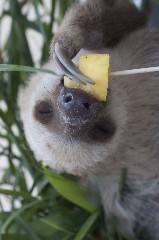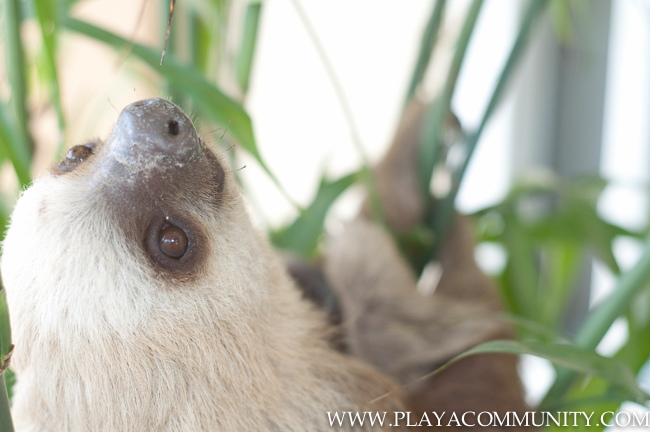Sloth Spends the Day in Expat's Front Yard

Yesterday, February 23 at approximately 10:00 a.m. Coronado residents, living on the the Coronado Golf course, realized there was a two-toed sloth hanging out in their front door planter! The 5' high ornamental bamboo plant seemed like an odd place for a sloth. So, concerned about the animal's well-being they called several people in the community for advice on what to do. When PlayaCommunity received news about the sloth, we reached out to our friends at Conservación Panamá. While many community members offered to relocated the sloth to a more secluded environment, Ezekiel Jakub of Conservación Panamá advised otherwise. Zeke told us that unless the animal was in clear distress, the best thing to do would be to let him be. "Often animals come into areas where it is odd to see them" explained Zeke, "usually they are just passing though". In this case it seemed likely that the sloth was a juvenile, and indeed just passing though the territory. so we passed along Zeke's advise, "so long as the sloth seems generally protected from predators, let him move on his own, when he is ready."
Armed with this knowledge, the helpful Coronado residents stood watch over the sloth throughout the day making sure none of the neighborhood dogs and cats bothered him.
The sloth was still hanging around well into the afternoon, when the couple offered up some fresh pineapple for lunch, their guest graciously accepted it.
The sloth seemed pretty content lounging in the bamboo planter snacking on the occasional pineapple chuck between naps. However, just as Zeke thought, the sloth moved on… slowly, as sloths typically do. Around 10:30 p.m. the couple noticed the sloth was no longer in the font door planter. They looked around for him, but he was gone. While they were sad to see their new friend go, they were happy he was able to make his way to a bigger tree and continue his life as a wild sloth.
Contact between wildlife and people occurs often in Panama, from remote villages to the growingly busy streets of Coronado. Interactions between humans and animals, from sloths to snakes to wild cats, are increasing. With little information on how to respond in these scenarios, conflicts can occur.
In the case of the Coronado Sloth, nobody was threatened, and no conflict occurred. The sloth was happy to nap in the bamboo plant, and the residents, happy to watch over during his visit. However, as a community we may not have been properly informed on how to act. Our first thought, and that of several other community members, was relocation. In this case, moving the sloth from his beach habitat may not have been the best move.
Luckily we were able to educate ourselves quickly and attend to the matter properly, achieving a happy ending for everyone involved.
Unfortunately, human-animal interactions do not always end so well. Typically it is the animal that suffers.
Panama is home a wide variety of wildlife that is increasingly in need of our protection. While sloths, pose no threat to humans, other poisonous amphibians and larger mammals, like jaguars or ocelots, might. If you found out there was a wild cat in your community what would your reaction be? In this scenario many might decide that the use lethal force is necessary. Not because they hate the animal, but in fear for their children, domestic animals or livestock. The reaction to animals that pose a threat to humans is typically to kill them. However, killing the animal is almost always avoidable.
Currently, Conservación Panamá's Mammalogy program is proposing to develop, train and put into affect a “wildcat conflict rapid response team”. This team would travel to a conflict zone, educate and train the local communities how to resolve conflicts without lethal force and help develop appreciation for the conservation of wild cats in Panama.
The NGO's founders Melva, President and Director of Mammalogy for Conservación Panamá, and Zeke, director of Ornithology, will be in the Pacific Beach area of Tuesday March 31 to discuss human-wildlife conflict and an action plan to help resolve these conflicts.
Interested in learning more? Join Conservación Panamá & Playa Community at a very special La Teca Happy Hour on March 31st from 5:00 PM onwards. Melva will be giving a prevention on the proposed wild-cat conflict program from 5-6 and be available to answer questions related to human-wildlife conflict in Panama afterwards.
La Teca is located in the Village Mall (Matchetazo Plaza) above Don Lee.
As always the Happy Hour will offer 2x1 drinks and a special tapas tasting menu.
A minimum donation of $10 toward Conservación Panama programs is appreciated.










